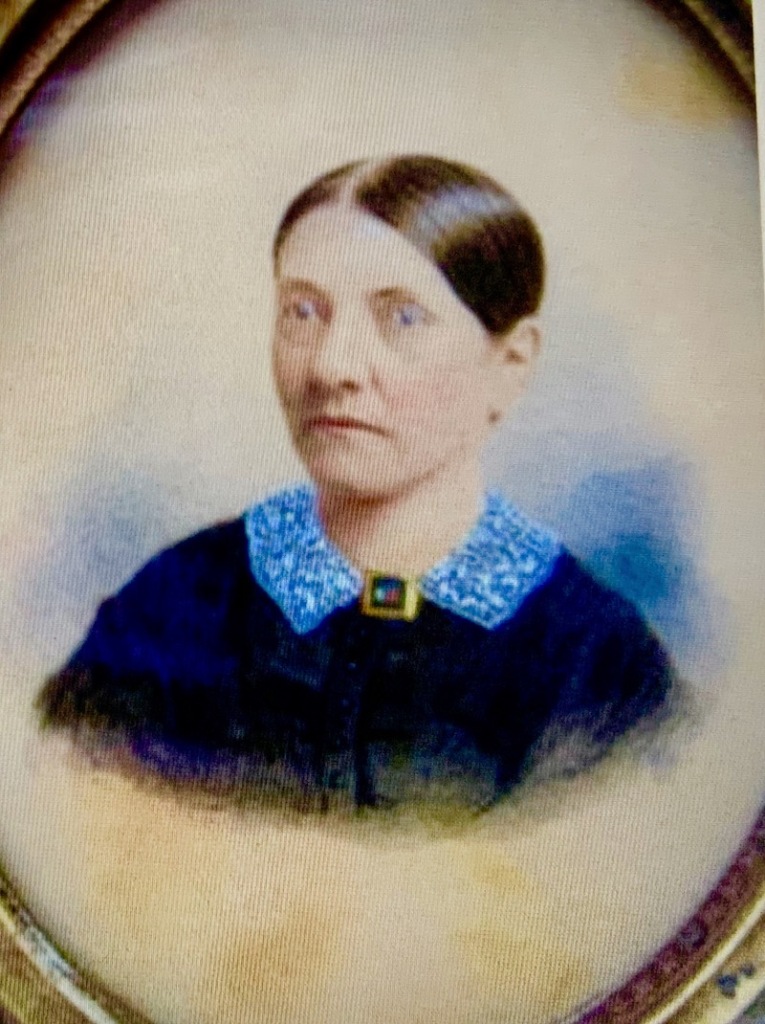
Catherine Mary Powell Noland Cochran (1814-1895) wrote a memoir and diary of her dramatic experiences during the Civil War. Her writing mentioned Loudoun County Quakers and Unionists.
Photo courtesy of Barbara Hawley
Catherine Cochran (1814-1895) lived in Middleburg, Loudoun County, Virginia, a town about 12 miles from the Quaker community of Lincoln. Cochran was a strong supporter of the Confederacy, with a son in a Virginia artillary regiment. Cochran kept a memoir/diary covering the Civil War years of 1861-1865.
Several times in her writing Catherine Cochran mentioned Quaker neighbors who occupied north-western Loudoun County on farms and villages such as Waterford, Goose Creek (now Lincoln), Harmony (now Hamilton), Hillsboro, and Union (now Unison). The German settled town of Lovettsville in western Loudoun County was, like the Quaker communities, strongly anti-slavery and anti-secessionist.
By July 1861, three months after the start of war, Union troops had moved across the Potomac river into Loudoun County. Catherine Cochran wrote of Loudoun County’s “chief magistrate” – her brother, Burr Powell Noland – interacting with a Union colonel:
“He [Union Colonel John W. Geary] had sent for him [magistrate Burr Powell Noland] that he might convery to the citizens of Loudoun assurances of their protection and friendly intentions. So as to quiet the public mind and prevent a panic, the rebellion was virtually quelled – past offences should be forgotten and Secessionists and Unionists fare alike.
Said the magistrate: “I suppose, Colonel, you are aware that you have passed the line of sympathizers and, from henceforth, you’ll find the country a unit against reunion?”
He replied: “I am aware of that.” Feeling they are in a hostile land, their present policy is conciliation but, in the disloyal portion of Loudoun, where Unionists prevailed, their course was very different, all true men were made to suffer. And that is what we may expect when they have us firmly in their grasp.

Catherine refers to the area of Loudoun County where Quakers and Germans dominate, the “line of sympathizers” as the “disloyal portion of Loudoun, where Unionists prevailed… .” The real Southerners, the “true men,” in Cochran’s eyes, were treated harshly by Geary’s troops.

During the Burning Raid of November 1864, Cochran wrote: “Next morning, we could trace their [Federal soldiers] course by the smoke, the further they went, the greater the destruction. In vain the Quaker pleaded his neutrality, the Union man his loyalty – all fared alike. They [Federal officers] argued, if they did not burn the grain, the rebels would get it … .”
Proving the Union officers correct that “if they didn’t burn the grain, the rebels would get it,” Cochran wrote four months later, on March 24, 1865, of the Union cavalry taking crops and meat, in response to Confederate cavalrymen raiding these items from Unionist Quaker and German immigrant citizens:
“For a day or two, we have had rumours of a force of Yankee cavalry and infantry who came from Harper’s Ferry and were making the circuit of Loudoun with a wagon train, taking grain and meat, tis said, in retaliation for the supplies which [John Singleton] Mosby’s [Virginia 43rd Battalion] men have taken from the Union men in upper Loudoun. Day before yesterday, there was a fight near Purcellville when Mosby whipped their cavalry and ran them back to the infantry. They are estimated at 700 infantry and 400 cavalry. Since then, Mosby has followed them around.”

Catherine Cochran’s brief mentions of Quakers and “Union men” give us a idea of how the majority of Loudoun County citizens viewed their Unionist neighbors. Unlike Confederates, with an army and political backing, the southern Quakers had no where to turn for support. Their state, Virginia, was at war with the United States government but, to an extent, was also at war with them.
0 comments on ““…in vain the Quaker pleaded his neutrality.””